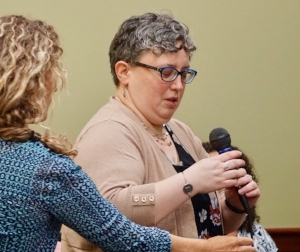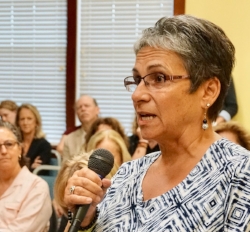By Gina Macris
This article has been updated.*
Seven months after Rhode Island state social workers were retrained to better administer a questionnaire used to determine Medicaid funding for adults with developmental disabilities, signs have emerged that not all the interviewers may be conforming to the highly scripted assessment process.
On June 13, the chairman of the Employment First Task Force said the group needs more comprehensive information about any continuing problems with the assessment, the Supports Intensity Scale (SIS). He said he will make a request in writing to the U.S. Department of Justice and a federal court monitor, asking them to look into the situation.
Rhode Island is in the fourth year of implementation of a 2014 federal consent decree asserting the rights of adults with developmental disabilities under provisions of the Americans With Disabilities Act to obtain the services they need to secure jobs and enjoy non-work opportunities in the community.
The consent decree is “very clear” on those rights, said the federal court monitor, Charles Moseley, who listened into the meeting in a conference call.
Moseley said he was “disturbed” to hear an account of a SIS interviewer who said that because a young man was employed, even part time, he could not have the extensive behavioral and medical supports that family members and the service providers said the man needed. In fact, without those supports, the young man could not keep his job. The task force member who addressed Moseley by telephone in the meeting later asked not to be identified.
Another task force member, Claire Rosenbaum, Adult Supports Coordinator at the Sherlock Center on Disabilities at Rhode Island College, recalled two SIS interviews she has attended since the social workers administering them were re-trained. One was done very well. In the other, the SIS supervisor corrected the interviewer twice.
For example, an interviewer may ask whether certain behavioral problems occur, or whether they have occurred in the last year. But Rosenbaum indicated that the proper phrasing for the SIS is to ask what supports are necessary to prevent those behavioral problems.
The latter approach acknowledges the impact of existing supports in helping adults with developmental disabilities enjoy a better quality of life, something parents and providers had routinely complained was missing from the SIS before the interviewers were retrained.
*(On June 15, Claire Rosenbaum said her comments were not intended as criticism of the SIS interviewers but to make the point that the retraining of interviewers was followed up with supervisory coaching as reinforcement. The two SIS interviews she attended were appropriately administered, she said. She said her comments, while intended to be positive, did not preclude the possibility that an interviewer or two may not be immediately absorbing the training and coaching provided).
SIS Has History of Controversy in RI
The way Rhode Island uses the SIS to establish funding has been criticized both by the monitor and the DOJ since 2014, when Justice Department lawyers found that there was at least the appearance of a conflict of interest because the agency which administers the questionnaire also allocates individual funding.
Since then, the fiscal arm of the agency which administers the SIS, the Department of Behavioral Healthcare, Developmental Disabilities and Hospitals, (BHDDH) has been transferred to the Executive Office of Health and Human Services (EOHHS).
But Kevin Nerney, the Task Force chairman, said that to the average Rhode Islander, “the state is the state.” Task Force members floated the idea of having a non-state entity administer the SIS assessment.
The American Association of Intellectual and Developmental Disabilities, (AAIDD), which developed the SIS, has urged states to avoid even the appearance of a conflict by making a clear separation, or firewall, between the actual interview and the allocation process.
A U.S. District Court order issued in May, 2016, required the state to change its policy to specify that the scores on the SIS will be “consistent with individuals’ support needs, separate and apart from resource allocation considerations.”
Moseley, the monitor, in reporting to Judge John J. McConnell, Jr., earlier this year, the monitor, Moseley, took that idea a step further. In conjunction with bringing greater individualization to supports for adults with developmental disabilities, he has ordered the state to give him quarterly progress reports as it works toward changing its approach to determining needs and funding. Instead of translating SIS scores into one of five funding levels, as it does now, the state should use the interview results to first draw up individual programs of support. Only then should it apply funding, according to the model envisioned by the monitor.
Meanwhile, Nerney, the Task Force chairman, said outside the Tuesday meeting that the group has repeatedly asked BHDDH over the past two years – without success - for the number of appeals filed by providers or family members contesting funding levels resulting from the SIS.
While that number has not been made public, state Sen. Louis DiPalma, D-Middletown, disclosed in a Senate Finance Committee hearing in April that the appeals generate a total of $21.5 million to $22 million a year in supplemental payments above and beyond the levels determined by the SIS. That amounts to about 10 percent of all payments made to the private agencies that provide most of the services.
Ten percent is too high, DiPalma said, urging BHDDH officials to rework the way they use the SIS.
Consent Decree Allows Exceptions to 'Employment First'
The Task Force also discussed various approaches to developing a variance process under provisions of the consent decree for individuals with developmental disabilities who can’t work or don’t want to work because they fear the challenges of the regular employment. Language for one or more kinds of variances or exceptions is being drafted, task members reported.
In conjunction with an interim settlement between the City of Providence and the DOJ in 2013 and the subsequent statewide agreement in 2014, the state has adopted an “Employment First” policy which assumes that adults with developmental disabilities can work at regular jobs, with support.
This policy generally has been welcomed by young people, particularly those who have had internships as part of their special education programs in high school and looked forward to working as adults.
But that reaction has not been universal. After the policy was adopted in 2013, BHDDH abruptly closed most sheltered workshops without having any plan in place to gradually acclimate those clients to community-based services. The move generated a wave of anger from families whose loved ones had enjoyed the social aspect of the workshops and took pride in their paychecks, even if they were a fraction of the minimum wage.
Since Governor Gina Raimondo beefed up the state’s response to the consent decree in 2016, various high-ranking state officials have made public assurances that no one will be forced to work if they don’t want to or are unable, contrary to what some families say they have heard from rank-and-file employees in the developmental disability system.
In a task force discussion on Tuesday of what a variance to the “Employment First” policy might look like. Claire Rosenbaum, Adult Services Coordinator at the Sherlock Center on Disabilities at Rhode Island College, said she understands that some families are turning to segregated adult day care programs for their loved ones that are outside the system licensed by BHDDH.
These adult programs, licensed by the Department of Health, may take private payments or federal Medicaid funding, according to anecdotal remarks by various task force members.
Moseley, the monitor, said that if Medicaid funding is involved, federal regulations emphasizing community-based services, similar to those of the consent decree, would apply. Both the consent decree and Medicaid regulations governing Home and Community Based Services (HCBS) derive their authority from the 1999 Olmstead decision of the U.S. Supreme Court. The High Court said that individuals with disabilities must be offered services in the least restrictive environment that is therapeutically appropriate, and that environment is presumed to be the community.
Kiernan O’Donnell, co-president of the Rhode Island Association of People Supporting Employment First, said that if families had more information, they wouldn’t be going to segregated programs.
The Task Force, meanwhile, discussed the importance of planning around the individual needs of a particular person. While the principal goal may be employment for one person, it may be health for another, said Deb Kney, director of Advocates in Action.
Planning is a “process. It’s not a form” for checking boxes, she said. Others agreed.
The Employment First Task Force was created by the 2014 Consent Decree to serve as a bridge between the community and state government, with membership drawn from community agencies serving adults and teenagers with developmental disabilities, those who receive services and advocate for themselves, and families. Nerney, the chairman, represents the Rhode Island Developmental Disabilities Council.












